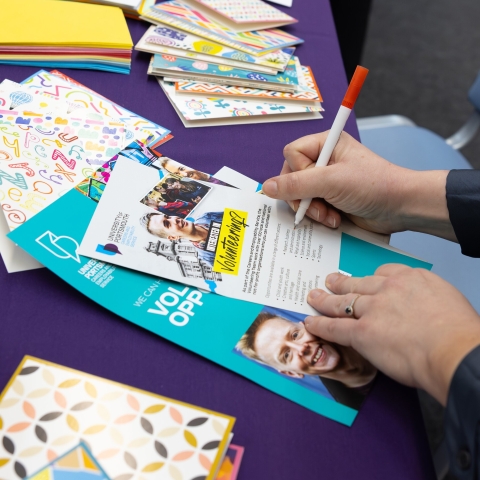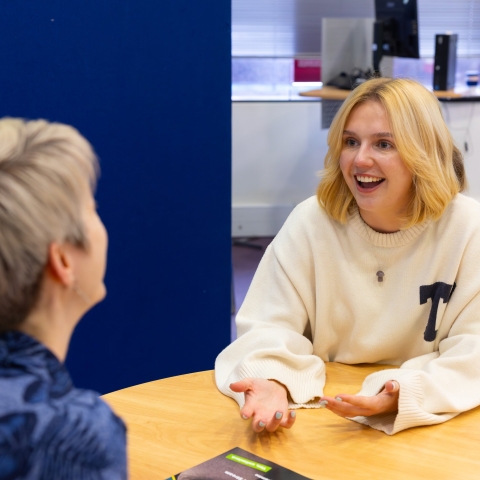

Gain real-life employability skills and work experience with a placement year
If you're interested in completing an optional work placement (one that is not a compulsory part of your course), you'll find all the help you need - from searching for a role through to support during your placement year - at Careers and Employability.
Evidence from past students shows that taking a placement year can greatly improve your job prospects and starting salary. It can also boost your academic grades, on average by up to half a degree classification.
Received a placement offer?
Let us know here!
If you’ve been offered a placement, you need to let us know as soon as possible. We’ll check your offer meets the placement requirements and contact you with the next steps.
How placements work
Learn about your options and the support you'll receive throughout your placement journey.
Find and apply for a placement role
Discover the best places to find placement roles specific to your industry.
Self-Employed Placement
We're one of the few universities in the UK that will support you with starting your own business or freelancing during your placement year. You'll receive guidance from our Student StartUp team throughout your placement year.
Placement Club
Support is available before, during and after your placement. We hold weekly Placement Clubs every Tuesday and Thursday, where you can work on your placement search and applications in a relaxed environment.
Getting started with placements
We offer expert advice, the latest placement opportunities and support when you are on your Placement.
Thinking of completing a placement? You need to:
- Book a chat with the team or let us know you're interested by contacting placements@port.ac.uk
- Search for Year-Long Placement opportunities on MyCareer.
- Keep checking your emails for the latest placement opportunities and support.
Placement Support at the University of Portsmouth
At the University of Portsmouth, there's a wealth of support available to help you secure the perfect placement year.
You've got nothing to lose and everything to gain.
At the end it's so satisfying to look back at the start and think about how much you've grown and how much you've achieved.
A placement year is the opportunity for a student to explore a job role or self-employed placement in their chosen sector.
Some students also go on to undertake a placement year abroad, and with the new connected degree offer, students have the chance to choose when they actually do their placement.
Before applying for placement I had a lot of support from Careers and Employability.
They host these 20 minute appointments where you can just walk in with your CV and get a lot of advice.
We can support with checking applications before they submit it, support with interview processes, whether that be an assessment centre or a video interview.
During my placement year I was based up in Newcastle.
I worked as a research and development intern for Procter & Gamble.
Day to day I was mainly in the laboratory carrying out tests.
I was lucky enough to have a cluster of interns during my placement, so it was nice to get to know each other and we still keep in touch.
I could talk for ages about the skills that I learnt.
Right now I can make the best presentation ever.
My confidence and my courage has improved so much.
Boosting obviously your employability prospects as well as achieving a high academic attainment.
My grades are a lot better after learning the skills that I did.
Of course a placement looks great on a CV.
In some cases students who complete a placement get offered a graduate job with their placement employer so this is again a fantastic opportunity to get your foot in the door, to develop your skills, gain experience and of course make loads of friends.
When I applied for my placement I had so much support from the Careers and Employability Service.
They had a website where they'd list all the upcoming placements, so I basically just lived on that website, applied to every single one.
There's lots of resources on our My Port Careers page, including career guides specific for industry.
We've got a really good AI tool where students can upload their CV and get instant feedback.
We've also got lots of templates for CVs, cover letters, application forms, and also our dedicated online jobs board as well.
You get a year out of university so you can ease your mind from an exam perspective.
You gain so much experience and you come back ready to smash your final year.
So if you are interested in doing a placement, we'd love to hear from you.
You can drop us an email or come to visit us in the centre.
Benefits of completing a placement
- Boost your job prospects and potential starting salary
- Build your professional network before graduating
- Increase your workplace skills and access to professional roles
- Graduate with a professional mindset and industry experience
- Potential to be invited back for a graduate job role
- Boost your chance of getting a 2:1 or first-class degree
- Use your final year to explore and apply for jobs
- You’ll likely find better-paid, professional work faster if you have a placement year on your CV.
- Students who do placements are often offered a permanent job, back with their placement employer.

Placement stories
Here are just a few of our amazing students.
Technology Placements
Pelham talks about his experience on placement as a Technology student.
I decided to do a placement due to employers requiring real world experience and it's hard to go into a field without any background knowledge or experience in it. So a placement year would be the best way to get both of those things.
One of the most important things that you can't be taught in class is the importance of good communication skills and good interpersonal skills. It's not just about what you know, it's also about who you know and how to get the information across in an efficient way.
The advice I'd give to students considering doing placements is absolutely go for it, you will not regret it. It is one of the best things you can possibly do to prepare yourself for a career.
Science and Health Placements
Oakley talks about her experience on placement as a Psychology student.
The placement opportunity was a massive pull for me because psychology is huge.
There are so many opportunities, so many different career options you can explore. So it was really useful for me to be able to go down those avenues to work out what I wanted to do before I got there.
My placement was in frontline mental health. I learnt a lot about not only my degree, my subject and my field, but also about myself, I think.
It really helped consolidate my learning, there were a lot of things that I had learnt in my course that were then translated and I could see them working in practice.
So the University of Portsmouth really helped me to realise who I am by allowing me to pursue these career opportunities.
Business and Law Placements
Amy talks about her experience on placement as a Business and Law student.
On placement, I found that it's quite affirming when you realise this is real life and you're doing a real job. It's not just textbook, it's what you’ve put into practice and that's an amazing feeling.
Being able to run my own projects and have the entirety of site see them has really boosted my confidence.
I feel very proud of what I've achieved within such a short time frame. I would encourage anybody who's considering doing a placement to go for it. It's been life-changing for me.
Humanities and Social Sciences Placements
Ellen talks about her experience on placement as an Early Childhood Studies student.
On my course, there are opportunities to have placements. It really helped me a lot to get to the place I am now.
I did a placement in one of the nurseries in Portsmouth and I was working with really young children, that I hadn't worked with before. I hadn't had the opportunity to work with such young children. Working with these younger years really showed me that this is something that I really enjoy and I have loved every second of it.
It's been such a real insight, a practical insight into learning with children and I'm able to use my knowledge, that I've used at university and learnt, in my teaching today.
Creative and Cultural Industries Placements
Jake talks about his experience on placement as a Television Broadcasting student.
I was extremely fortunate to get the experience at the football club. I don't think there's anywhere else that's offered anything like that.
I did a placement with Premier League Productions. I think it’s massively helped me to get where I am today and I think that's something that's just been so beneficial for my career, to have that on my CV, to say I've worked in club football, I understand club football and how media works within it.
Doing the placement year was absolutely crucial for me.I think it's massively thanks to the partnership between the football club and the university as to why I've got the experience that I do, which has then led me to employment.
Placement blogs
We support hundreds of students through placements every year. You can read more about their experiences, the challenges they have overcome and the highlights of their year through our Placement Blogs
Explore more in Building Work Experience
Volunteering
Discover how we can help you find and apply for volunteering opportunities to enhance your employability and get experience to add to your studies.

Internships
Find out all you need to know about gaining valuable industry experience through an internship

Student Startup support
Whether you’re looking to freelance, launch a new business or develop an existing one, the Student StartUp Team can support you.

Enable University alerts
Turn on notifications for critical updates like closures, safety alerts, and urgent service disruptions.





